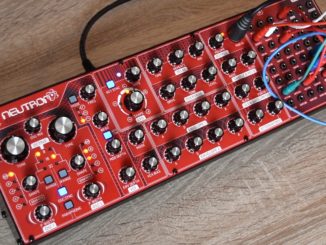According to a new Behringer post, ex-Moog CEO Mike Adams offered Uli Behringer the Moog brand to buy but rejected this offer.
The Moog sale to inMusic in June and the production job cuts that followed in September caused major discussions on social media. Many people ask themselves why the sale to inMusic and to another company that continues Bob Moog’s legacy. We will probably never know all the details.
YouTuber Benn Jordan published a new video that looks at the results of the last few months and tries to draw conclusions which also refer to and criticize B’s business practices. In a new post, Behringer does not agree with Benn Jordan’s video style and shares interesting “not 100% confirmed” details about the Moog deal.
Moog Behringer
In June, when the Moog inMusic deal became public, there was also discussion about why Behringer didn’t take over Moog. Many people found this an interesting idea. Others saw it as a nightmare. Now, B. has unveiled that this was an option for Moog.
According to the new post, ex-Moog CEO Mike Adams contacted Uli in May 2023 and offered him the Moog brand to buy.
In reality, in May of this year, Mike Adams, the CEO of Moog, reached out to Uli to propose selling Moog. Both individuals have had a longstanding friendly relationship. Therefore, Mike reached out to us first and shared all the financials as well the company’s challenges.
They also explain why the Moog sale came about
Mike’s decision to sell Moog was influenced by his advanced age and serious mistakes made on the supply chain side. The company had purchased excessive inventory, leading to significant cashflow constraints.
The takeover of Moog, however, did not take place. Uli rejected this because it didn’t fit into Behringer’s low-budget/price business model
While we believe Moog is a great brand, we declined the purchase due to our low-price business model not aligning with the luxury model Moog is pursuing.
Behringer continues:
While we believe Moog is a great brand, we declined the purchase due to our low-price business model not aligning with the luxury model Moog is pursuing.
Blaming us for Moog’s struggles is as reasonable as blaming Yamaha for the bankruptcy of Sequential, Oberheim, ARP and Moog in the 1980s when the DX7 and other digital synths were introduced to the market.We wish Moog and its people all the best and believe they have a great future. Both brands serve a very different customer base that can perfectly coincide. Our focus will always be on creating highly affordable products so everyone can discover the world of music. Our mission is to empower the musicians that don’t have deep pockets.As always, we encourage you to conduct your own research and form your own opinion. Mark.
inMusic Moog
Either way, the Moog we knew so far is history. inMusic will have its own plans for Moog and pursue different goals than the current one. We will see where this leads with the first new products under the leadership of Jack O’Donnell (CEO of inMusic).
I can’t confirm whether what Behringer says is true or not. For this to happen, there would have to be a statement from former Moog CEO Mike Adams that confirms or contradicts the B. post.





